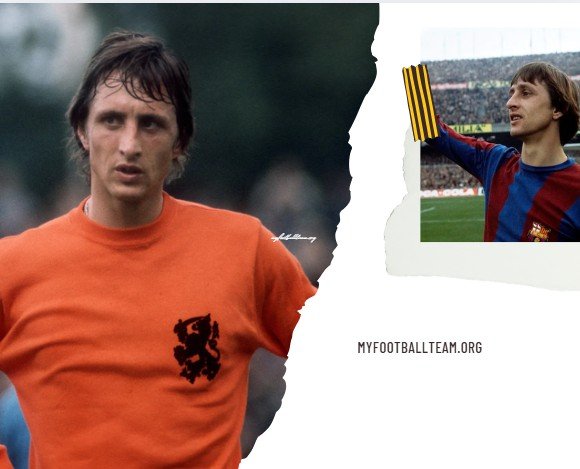Johan Cruyff is celebrated as one of the greatest football players and coaches of all time. His influence on the game was revolutionary, blending skill, intelligence, and charisma to create a style of play that inspired generations. His life story is filled with triumphs, struggles, and a legacy that reshaped football forever. Let’s delve into his incredible journey.
Early Life and Beginnings in Amsterdam
A Humble Beginning in a Football Family
Born on April 25, 1947, in Amsterdam, Netherlands, Hendrik Johannes Cruijff, known as Johan Cruyff, grew up in a working-class family. His father was a greengrocer, and his mother worked as a cleaner at Ajax, the football club that would become his home. From a young age, Johan showed exceptional talent in football, and his family supported his passion, despite financial struggles. His father’s passing when Johan was just 12 years old was a significant blow, but his mother continued to encourage his love for football, eventually helping him secure a spot at Ajax’s youth academy.
A Rising Star at Ajax
By age 17, Johan made his debut for Ajax’s senior team, quickly establishing himself as a promising young talent. His speed, vision, and ball control were unmatched. As he grew in skill, so did Ajax’s success. Under the guidance of coach Rinus Michels, Cruyff and Ajax became synonymous with “Total Football”—a fluid, dynamic style that emphasized skill and versatility.
The Philosophy of Total Football
Revolutionizing the Game
Johan Cruyff and Rinus Michels crafted the concept of “Total Football,” which allowed players to interchange positions and play with fluidity. Cruyff’s versatility and intelligence were pivotal, allowing him to act as a playmaker while also scoring goals. This approach broke down traditional strategies and changed football forever, setting new standards for teamwork and technical excellence.
Defining a New Era at Ajax
During the 1960s and early 1970s, Cruyff and Ajax dominated European football, winning three consecutive European Cups from 1971 to 1973. Cruyff’s leadership, creativity, and incredible performances on the field helped elevate Ajax to a European powerhouse. His unique style earned him widespread admiration, and his number 14 jersey became iconic.
Triumphs and Challenges in Barcelona
A Historic Transfer
In 1973, Cruyff transferred to FC Barcelona for a then-record fee. His impact was immediate. The club, which had struggled in recent years, transformed under Cruyff’s leadership. He helped Barcelona secure their first league title in over a decade and became a beloved figure in Catalonia, not only for his skill but for his outspoken support of the Catalan people.
The “Flying Dutchman” and a Heroic Goal
Cruyff’s flair on the field earned him the nickname “The Flying Dutchman.” One of his most memorable moments in Barcelona was the legendary goal known as “The Phantom Goal.” In a match against Atlético Madrid, he defied gravity by jumping and hooking the ball into the net in mid-air—an unforgettable display of his athleticism and creativity.
Cruyff and the Dutch National Team
A World Cup Legend
Cruyff’s influence extended to the international stage with the Netherlands national team. During the 1974 World Cup, he led the Dutch team to the finals, dazzling the world with their Total Football. Although they narrowly lost to West Germany in the final, Cruyff’s performance earned him the Golden Ball award as the tournament’s best player. His “Cruyff Turn”—a quick pivot move that left defenders behind—became famous and is still widely used today.
Standing Up for His Beliefs
Cruyff was known for his outspoken nature and strong beliefs. He famously boycotted the 1978 World Cup due to political and safety concerns, highlighting his principle-driven approach to life and sports. Although his decision likely cost him a chance at the World Cup title, it cemented his reputation as a man of integrity.
Cruyff as a Coach and the Legacy of “Tiki-Taka”
Returning to Barcelona as a Visionary Coach
After retiring as a player, Cruyff transitioned into coaching. His first major role was with Ajax, where he continued to innovate. However, it was his tenure as Barcelona’s manager from 1988 to 1996 that left an indelible mark. Cruyff’s coaching philosophy emphasized possession, passing, and attacking play—principles that became the foundation of “Tiki-Taka” football. Under his guidance, Barcelona won their first European Cup in 1992, with players like Pep Guardiola and Ronald Koeman carrying his vision onto the field.
Creating Barcelona’s “Dream Team”
Cruyff built Barcelona’s “Dream Team,” a lineup that included legends like Hristo Stoichkov, Michael Laudrup, and Romário. This team dominated Spanish and European football in the early 1990s, winning multiple league titles and trophies. Cruyff’s philosophy turned Barcelona into a club known not only for success but for an appealing, attractive style of play.
Influencing Future Generations
Cruyff’s ideas influenced an entire generation of coaches, including Pep Guardiola, who took the tiki-taka style to new heights with Barcelona and the Spanish national team. Today, Cruyff’s legacy is seen in the playing style of clubs around the world that prioritize ball control, teamwork, and fluid movement.
Cruyff’s Humanitarian Work and Personal Beliefs
Johan Cruyff Foundation
Beyond football, Cruyff was deeply involved in philanthropy. He founded the Johan Cruyff Foundation, which promotes sports and fitness for children, especially those with disabilities. Through his foundation, he championed the importance of sports as a way to improve quality of life and instill values like teamwork and resilience.
A Unique Approach to Life
Known for his bold personality, Cruyff wasn’t afraid to challenge norms and stand by his principles. Whether it was advocating for player rights, pushing for social reforms, or helping the underprivileged, he used his influence for good. Cruyff’s independent nature and belief in self-determination shaped his approach to both life and sports.
The Final Years and Lasting Impact
Health Struggles and Passing
In 1991, Cruyff suffered a heart attack, which prompted him to stop smoking and become an advocate for heart health. He continued working in football as a mentor and advisor, and his influence remained strong. Sadly, he was diagnosed with lung cancer in 2015 and passed away on March 24, 2016. His death was mourned worldwide, with tributes pouring in from fans, players, and clubs.
A Legacy That Lives On
Cruyff’s legacy lives on through the players he coached, the teams he inspired, and the fans who idolize him. His philosophy, creativity, and dedication to the beautiful game have immortalized him as one of football’s most influential figures. Today, the Johan Cruyff Institute, the Johan Cruyff Foundation, and numerous other institutions continue to honor his name and ideals, spreading his passion for football and life.
Conclusion: Johan Cruyff, More Than a Footballer
Johan Cruyff was not only a brilliant player and coach but also a visionary who transformed football. His innovative approach, charismatic personality, and dedication to his principles have ensured that his impact will be felt for generations to come.









